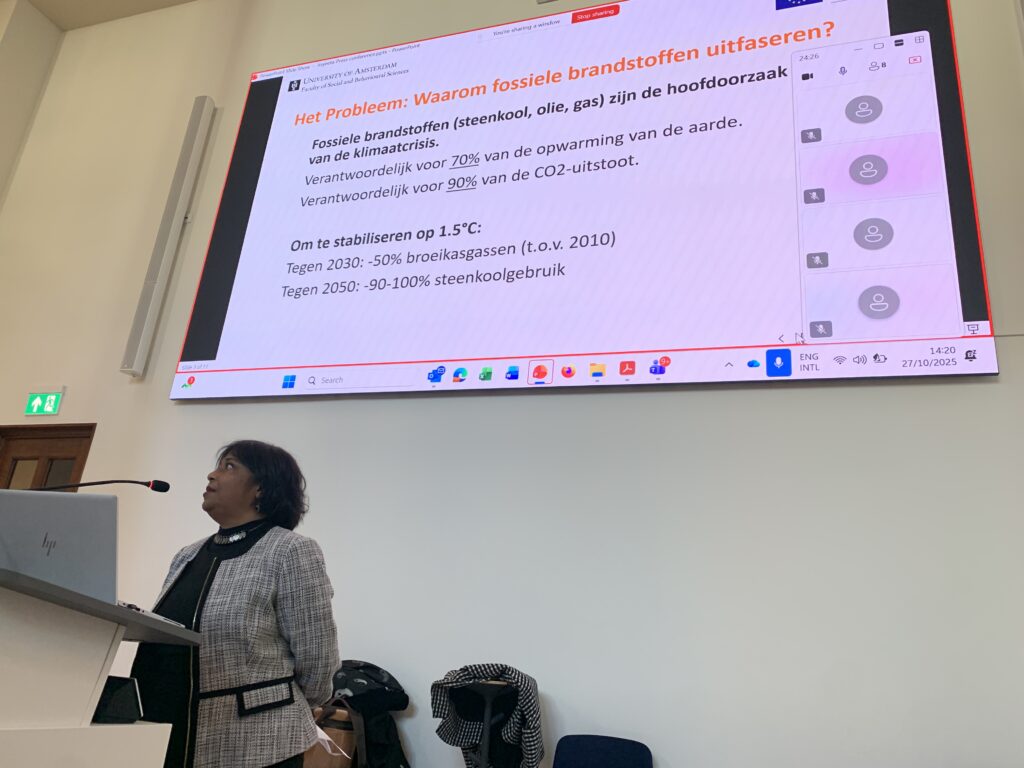Session Overview
Professor Joyeeta Gupta participated in the COP 30 Press Briefing held at the University of Amsterdam (UvA). The briefing featured a series of expert presentations on key climate topics.
Here is the full schedule from the event:
-
2:15-2:30 PM: Anna von der Heydt – Climate tipping points
-
2:35-2:50 PM: Wouter Peters – Bio-economy, forests and soils
-
2:55-3:10 PM: Robbert Biesbroek – Global adaptation
-
3:10-3:30 PM: Break, informal contact
-
3:30-3:45 PM: Pieter Pauw – Financing and the roadmap
-
3:50-4:05 PM: Joyeeta Gupta – Phasing out fossil fuels
-
4:10-4:25 PM: Michel den Elzen – NDCs for 2035
-
4:25-5:30 PM: Coffee, informal contact
Details
In her session, “Phasing out fossil fuels,” Professor Joyeeta Gupta outlined the urgent necessity of leaving fossil fuels underground and the pathways to achieving this justly.
Key Points from the Briefing:
Why Phase Out Fossil Fuels?
-
Fossil fuels (coal, oil, and gas) are responsible for 70% of global warming and 90% of CO2 emissions.
-
A rapid phase-out is essential to stabilize our climate.
-
To stabilize at 1.5°C, greenhouse gas emissions must be reduced by 50% by 2030 (compared to 2010), and coal use must fall by 90-100% by 2050.
-
Crucially, more than half of the world’s remaining oil and gas must be left in the ground.
The Path from COP 28 to COP 30
-
At COP 28 in 2023, Parties finally agreed to “transition away” (af te bouwen) from fossil fuels.
-
At the upcoming COP 30 in Belém, Brazil, Parties are expected to implement this by creating a roadmap for new climate finance, ending the exploration of new fossil fuels, and ensuring a just transition.
-
This will require financing in the order of $1.3 trillion for developing countries to ensure that affected workers and communities are not negatively impacted.
-
The “Baku to Belem Roadmap” aims to mobilize this funding, while the “Belém Action Mechanism for Just Transition” is expected to ensure equity.
Positive Momentum Professor Gupta highlighted several positive signals that momentum is growing:
-
International Law: Three advisory opinions from international courts emphasize that CO2 is a pollutant, 1.5°C is the legally binding goal, and states have an obligation to prevent significant harm to the climate system.
-
State Responsibility: The International Court of Justice (ICJ) advised that a state’s failure to take appropriate measures regarding fossil fuels (including production, permitting exploration, or providing subsidies) can constitute an “internationally wrongful act”.
-
Political Will: The EU Council (Oct 21) decided to promote a global phase-out of fossil fuels , and the World Conservation Congress (Oct 16) voted to support a fossil fuel non-proliferation treaty.
-
Global Action: The government of Colombia will host the first international conference on phasing out fossil fuels in April 2026.
Challenges and the Need for a Just Approach Despite this momentum, significant challenges remain, including disinformation campaigns , a decline in development finance , rising military expenditures diverting funds , and delay strategies from fossil fuel companies.
Professor Gupta stressed that the phase-out must be just:
-
In wealthy nations, renewable energy subsidies must be designed to help those with less financial capacity make the transition.
-
Globally, 78% of remaining fossil fuels are in developing countries. If they are not helped to phase out these fuels, “we all lose”.
Conclusion The COP in Belém must decisively address the phase-out of fossil fuels. Time is running out, and while there is significant global support, there are also powerful forces opposing this movement. The hope is that the COP will make a science-based decision.
